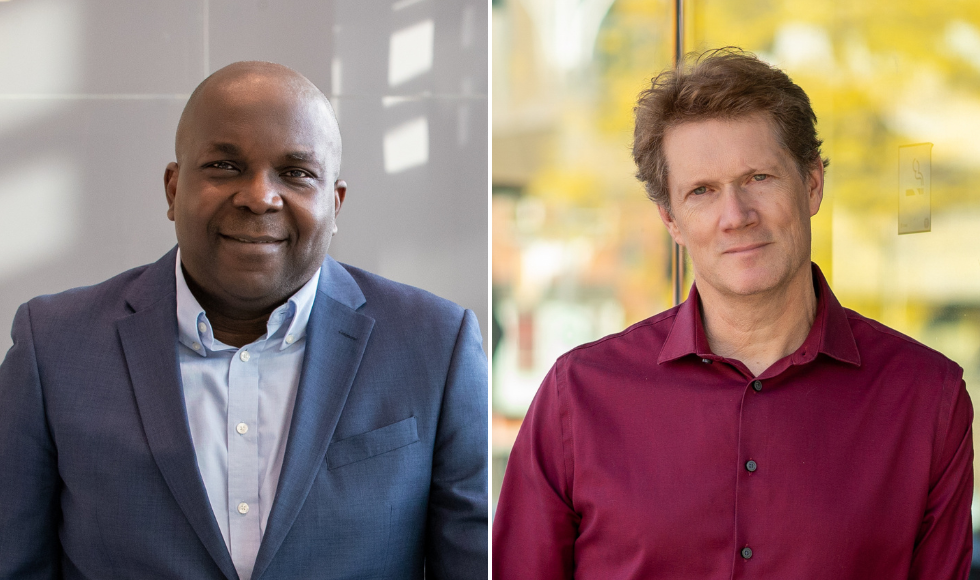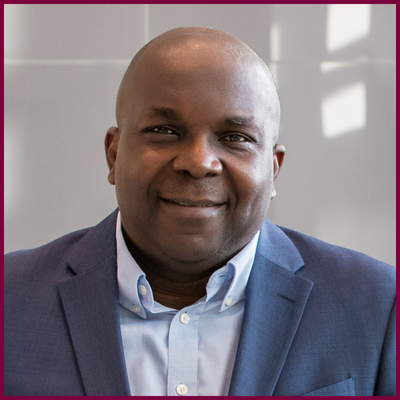McMaster researchers to share expertise in climate justice, sustainable healthcare at COP29

(Left to right) McMaster researchers Bonny Ibhawoh and Myles Sergeant will be among the world leaders at the upcoming Conference of the Parties to the UN Framework Convention on Climate Change (COP29). Photos by Georgia Kirkos/McMaster University.
November 8, 2024
Two McMaster researchers will be among the global experts at the 29th Conference of the Parties (COP29) next week, lending their expertise to critical conversations around climate change.
Bonny Ibhawoh, vice-provost, International, will be engaging in bilateral talks and part of an interactive dialogue on climate justice, sustainability and the right to development. The professor of legal history and global human rights serves as chair of the United Nations Expert Mechanism on the Right to Development in the UN Human Rights Office in Geneva.
Myles Sergeant, an assistant clinical professor in the Department of Family Medicine who is deeply entrenched in efforts locally, provincially and nationally to reverse the effects of climate change, will be part of a session on decarbonizing healthcare as part of the Canada Pavilion at COP 29.
We spoke to the two experts ahead of COP29, which is taking place Nov. 11 – 22 in Baku, Azerbaijan about what they hope to accomplish at the global summit and the work we can do with global partners to tackle the threat of climate change.

Ibhawoh will present the preliminary findings of a climate justice study he is undertaking with support from researchers at the McMaster Centre for Human Rights and Restorative Justice. He shared with us why climate justice, which is rooted in the understanding that the impacts of climate change are unevenly distributed across the globe, is an essential framework for global conversations about climate change.
What is your key focus in attending COP this year?
Ibhawoh: I’ll be doing two things — having bilateral consultations with key stakeholders and sharing some of my preliminary findings from a study I am working on for the United Nations around climate, justice and the right to development.
My mandate from the UN is to come up with what we call best practices or good practices for how we carry out climate action and climate justice. And my report will benefit from the perspectives gathered at COP29.
Learn more: Bonny Ibhawoh on why centring climate justice in our global efforts against climate change could bring myriad benefits for us all.
What do you hope comes out of these conversations around climate justice?
There has been some talk about climate justice, but it’s always in the margins, it’s always in the footnotes. So, what I’m really trying to do is to centre it, which is not an insignificant task.
I strongly believe that one of the reasons why we haven’t had as much traction on climate action is because there is a feeling that some people have been left out of the conversation — that their needs haven’t been adequately addressed and that there’s a preoccupation with the expectations and the needs and the imperatives of certain societies and not others. And so what you have is a whole process that is lacking legitimacy. And frankly, not having universal support in the way that we should be thinking about it.
And we need to communicate this centering in a way that is intelligible to public audiences, and that is convincing. Because climate justice is not just a Global South issue. It is for everyone. You need universal buy–in and I’m interested in building such consensus on climate action.
By centring climate justice, we can actually now begin to move the needle in a tangible way.

Sergeant, executive director of the Canadian Coalition for Green Health Care and co-lead of PEACH Health Ontario (a provincial initiative cultivating and sustaining partnerships across health care facilities to support climate action), will be presenting on sustainable healthcare at the Canada Pavilion at COP29, as well as announcing upcoming projects with partner organizations.
What is your key focus in attending COP this year?
Sergeant: In addition to some exciting announcements and my presentation on sustainable healthcare, supported by McMaster Planetary Health, I will be engaging with other healthcare leaders and physicians doing similar work. This is a great opportunity to learn from them and share what PEACH has been working on in Canada and specifically here in Hamilton, such as influencing hospital strategic plans to incorporate sustainability, developing a business case for sustainable menu options in hospitals, engaging with family physicians to lead sustainability initiatives, and researching how to reduce the environmental footprint of end-of-life care while improving patient care.
There are countries around the world who are working on this very, very big problem — and within the healthcare sector we think both about mitigating or decreasing the amount of damage that we do in our day-to-day business, and also about how we can be helping people with the human health effects of climate change.
We have a lot of similarities to the other countries in what we call the Global North — in that they have health infrastructure and systems like we have in Hamilton. In addition to learning from those with similar systems, we can learn from those from the Global South, who have extensive experience with resiliency, such as how to make healthcare systems that are resilient to storms and heat, etc.
In what way is McMaster uniquely positioned to work with global partners to tackle climate change?
McMaster University has a long history of collaborating both locally, nationally and globally. The university’s extensive network, partnerships and commitment to sustainability make it well-positioned to be a leader in this space.
With support from McMaster, we started PEACH Health Ontario three years ago and it was made up of, at the time, four volunteers and now three years later we have a full-time research coordinator and other supports from around the McMaster campus.
We make targeted healthcare toolkits and guides and focus on knowledge translation to make climate change initiatives accessible to various audiences such as clinicians, office managers and health care leaders.
One important area of focus is the supply chain — the things that we buy and how we’re procuring them, the medications and devices that we’re using, for example, whether we are using reusable devices.
There are so many areas where positive changes can be made, and collectively this can have a significant impact.


